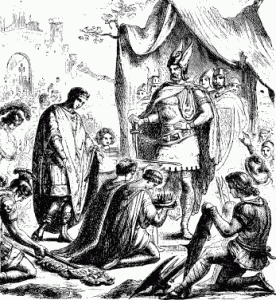Friday, July 22nd, 2011...4:01 pmChris Francese
The Fall of Rome
“De mutata Romae fortuna,” incerti auctoris, ed. N. E. Lemaire, Poetae Latini Minores vol. 4 (Paris, 1825), pp. 537-538.
Nobilibus quondam fueras cōnstructa patrōnīs
subdita nunc servis, heu, male Roma tuis.
Deseruere tui tanto te tempore reges;
cessit et ad Graecos nomen honosque tuus.
Cōnstantīnopolis florens, nova Roma vocatur, 5
moribus et muris Roma vetusta cadis.
Transiit imperium, mansitque superbia tecum;
cultus avaritiae te nimium superat.
Vulgus ab extremis distractum partibus orbis,
servorum servi, nunc tibi sunt domini. 10
In te nobilium rectorum nemo remansit,
ingenuique tui rura Pelasga colunt.
Truncasti vivos crudeli funere sanctos,
vendere nunc horum mortua membra soles.
Nam nisi te meritum Petri Paullique foveret, 15
tempore iam longo Roma misella fores.
My translation:
Once upon a time you had been built up by noble patrons; now, alas, Rome, you are shamefully subjected to your (former) slaves (i.e. the Goths). The emperors who ruled here for such a long time have abandoned you, and your name and title have been ceded to the Greeks. Flourishing Constantinople is called the New Rome, and old Rome is falling, in both the walls and the character (of its people). Political power has moved along, and your haughty attitude has remained with you; the pursuit of avarice is too much your downfall. A rabble drawn from the furthest regions of the earth, the slaves of slaves, are now your masters. None of the old noble leaders has stayed with you, and your native born sons tend Greek lands. You mained, mutilated and cruelly killed living saints; now you often set up a trade in pieces of their dead bodies. For if you were not keeping alive the memory of the good deeds of Peter and Paul, you would long ago have become a sad little town.
The Gibbonesque quote about men’s minds being “pusillanimous, gloomy, and spiritless” comes from The Life and Letters of Barthold George Niebuhr, and Selections from his Minor Writings, ed. Susanna Winkworth, 2nd ed., vol. 3 (London: Chapman and Hall, 1852), pp. 282-283, in an essay called “Sketch of the History of the City of Rome,” written in 1823.
Podcast: Play in new window | Download
Subscribe: Apple Podcasts | RSS


2 Comments
November 20th, 2011 at 5:41 am
I’d never heard of this before, but I like it. Any other gems from that period?
November 20th, 2011 at 4:45 pm
I’ll see what I can do!
Leave a Reply